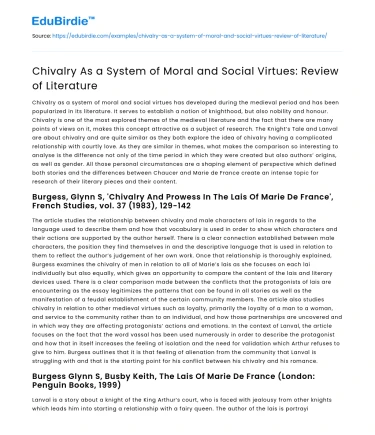Introduction
Chivalry, often associated with medieval knights, transcends mere historical connotations to represent a system of moral and social virtues. Originating in the Middle Ages, chivalry encapsulated ideals of bravery, courtesy, and honor, which were not only martial but also ethical in nature. Over centuries, these virtues have been reinterpreted and adapted, reflecting changes in societal values and norms. This essay reviews the literature on chivalry as a moral system, examining its evolution and relevance in modern society. By understanding chivalry's roots and transformation, we can appreciate its role in shaping ethical conduct and societal expectations. Furthermore, this exploration addresses counter-arguments, asserting the continued applicability of chivalric ideals in contemporary contexts. The aim is to provide a comprehensive analysis that underscores chivalry as a dynamic and enduring framework for moral and social virtues.
The Historical Context and Evolution of Chivalry
Chivalry originated as a code of conduct for knights during the medieval period, emphasizing martial prowess alongside virtues such as loyalty, humility, and respect for women. The literature underscores chivalry's dual nature, balancing martial obligations with societal expectations of noble behavior. According to Maurice Keen in "Chivalry" (1984), the chivalric code served as a moral compass guiding knights in both warfare and peace, fostering a sense of unity and purpose. This duality is evident in the chivalric romances of the Middle Ages, where knights like Sir Gawain epitomized the struggle between personal honor and moral duty.
Save your time!
We can take care of your essay
- Proper editing and formatting
- Free revision, title page, and bibliography
- Flexible prices and money-back guarantee
Over time, chivalry evolved, influenced by cultural, religious, and philosophical shifts. The Renaissance period witnessed the dilution of martial aspects, with greater emphasis on courtly manners and moral integrity. Scholars such as Jennifer Goodman in "Chivalry and Exploration" (1998) highlight the transition from a military code to a broader social ethic, reflecting changes in societal values. This evolution is critical in understanding how chivalry adapted to remain relevant, providing a framework for moral conduct in varying contexts. The adaptability of chivalry is a testament to its foundational role in shaping societal virtues beyond its medieval origins.
Chivalry in Modern Contexts: Relevance and Critiques
In contemporary society, chivalry is often perceived as an outdated or romanticized ideal. However, literature indicates its enduring relevance as a moral framework. Modern interpretations of chivalry advocate for gender equality and social justice, aligning traditional virtues with current ethical standards. For instance, David Crouch in "The Birth of Nobility" (2005) argues for a reinterpretation of chivalric values to promote inclusivity and respect across social strata. Such reinterpretations highlight the potential for chivalry to address modern moral dilemmas, reinforcing its adaptability.
Nonetheless, critiques of chivalry point to its historical roots in patriarchy and elitism. Critics argue that traditional chivalric codes often reinforced gender hierarchies and class distinctions, limiting their applicability in egalitarian societies. Feminist scholars, as noted by Clare A. Simmons in "Medievalism and the Quest for the Real Middle Ages" (2001), challenge the romanticized portrayal of chivalry, advocating for a critical reevaluation of its virtues. By addressing these critiques, proponents of modern chivalry seek to redefine its virtues, promoting a more inclusive and egalitarian moral system.
Chivalry as a Guiding Ethical Framework
The literature on chivalry as a moral system highlights its potential as a guiding framework for ethical conduct. By integrating traditional virtues with contemporary values, chivalry can serve as a model for personal and societal ethics. The emphasis on honor, integrity, and respect resonates with modern calls for ethical leadership and social responsibility. Scholars such as Richard Kaeuper in "Holy Warriors: The Religious Ideology of Chivalry" (2009) underscore the enduring nature of chivalric principles, advocating for their application in diverse contexts, from corporate ethics to international relations.
By acknowledging chivalry's historical roots and addressing its critiques, we can appreciate its role in shaping moral and social virtues. The adaptability of chivalric ideals allows them to transcend historical boundaries, offering a timeless framework for ethical conduct. This exploration of literature affirms chivalry's relevance, challenging us to reinterpret its virtues in light of contemporary challenges.
Conclusion
Chivalry, as a system of moral and social virtues, has demonstrated remarkable adaptability and relevance throughout history. From its origins as a knightly code to its modern reinterpretations, chivalry continues to influence ethical conduct and societal expectations. By understanding its evolution and addressing critiques, we can appreciate chivalry's role as a dynamic moral framework. The literature reviewed underscores the enduring value of chivalric virtues, advocating for their integration into contemporary ethical discourse. As society grapples with complex moral dilemmas, chivalry offers a timeless guide, inspiring individuals and communities to uphold values of honor, integrity, and respect. Ultimately, chivalry's legacy lies in its ability to inspire moral excellence, transcending historical constraints to shape a more ethical future.






 Stuck on your essay?
Stuck on your essay?

